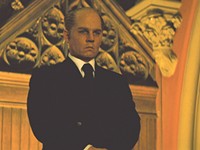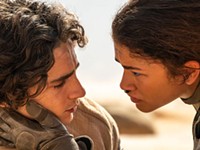[
{
"name": "500x250 Ad",
"insertPoint": "5",
"component": "15667920",
"parentWrapperClass": "",
"requiredCountToDisplay": "1"
}
]
The filmography of Wes Anderson is not like a box of chocolates, because at this stage of the game you pretty much know what you're gonna get: a tale of how parents don't understand their children told through meticulously whimsical production design and a soundtrack teeming with often obscure 60's pop. Anderson's second film, 1998's "Rushmore," was his first big success, and it's easily one of my five favorite movies ever. As the years have passed, though, Anderson has simply done variations on a theme. That it's his own weirdly wondrous theme is definitely a saving grace, but what once seemed fresh and inspired has come to feel trite, derivative, and — please know that this hurts me more than it hurts Wes Anderson — dull.
"Moonrise Kingdom" is Anderson's latest, and though I've already essentially outlined it, a few specifics probably won't kill me. The year is 1965, and a bespectacled 12-year-old Khaki Scout named Sam (newcomer Jared Gilman) has bolted from a vaguely New England-y summer camp to rendezvous with the young lady who bewitched him in her raven costume during the local church's reenactment of the Great Flood. Her heavy eye makeup evoking a younger Margot Tenenbaum, Suzy (Kara Hayward in her film debut) is fleeing an unsatisfying home life headed up by two miserable parents (consummate pros Frances McDormand and Bill Murray). We flash back to Sam and Suzy's adorable courtship through exchanged correspondence, and we tag along as they run off together, battery-operated record player and stolen library books in tow.
The adults are, of course, concerned; besides Suzy's mom and dad, the search party includes the perpetually underrated Bruce Willis as New Penzance's lone, lonely cop and a delightful Edward Norton as Sam's well-meaning but mildly incompetent scoutmaster. (The opening scene, an intricate, unbroken diorama-rama in which the scoutmaster inspects the camp, is typically bravura Anderson.) Telling details about their emotional lives emerge as the smitten runaways set up housekeeping at a peaceful little inlet, while unexpected entanglements among the adults come to light, too. As usual, nobody's happy, and the deadpan script, written by Anderson and Roman Coppola (they also collaborated on "The Darjeeling Limited") and veering between twee and wise, allows its characters to work through their issues a bit too efficiently.
With his thick glasses and calmly officious attitude, Gilman can't help but bring to mind "Rushmore" hero Max Fischer. (Sam on the dangers of turtles: "They'll bite you if you put your fingers in their mouths.") Gilman and Heyward are the thumping heart of "Moonrise Kingdom," and both thankfully refrain from coming across as precocious despite trying to navigate grown-up situations. Otherwise, it's the Anderson status quo: expressive music, carefully crafted sets, and Robert Yeoman's vivid, matchless cinematography. So maybe it's greedy, in the face of all those artistic riches, to wonder whether there's anything else. Anderson has made seven films — some OK, some amazing — and they've all been more or less the same. My hope is that one day soon, he will surprise me again.
Sometimes, when watching youngsters act, it's painfully obvious that they're reciting lines written by some middle-aged guy. The other option might be to let the kids improvise, but that sounds as though it could test the patience of even the saintliest saint. So I'm not sure how Japanese filmmaker Hirokazu Kore-eda was able to coax such natural, lived-in performances from the largely pint-sized cast of the lovely and heartwarming "I Wish." It no doubt helps that the two main characters are siblings in real life; Koki and Ohshiro Maeda play Koichi and Ryu, brothers evenly divided between estranged parents, at least one of them hoping for a reconciliation.
The introspective Koichi's plan is to wish for a volcanic eruption that will force him and his mother back to the home where the noisy and madcap Ryu still lives with their father. This hinges on the wish being made at a very specific time and place, and "I Wish" follows Koichi and Ryu separately in the days leading up to it. The film drags a bit when it's just adults on screen, probably because Kore-eda — he also worked with a bunch of talented children in 2004's wrenching "Nobody Knows" — traffics so effectively in the seemingly throwaway but beautifully crucial elements of being a kid, like cleaning your room, getting sidetracked by some dazzling flowers, and the quiet contemplation of life's unfolding mysteries.
Latest in Movie Reviews
More by Dayna Papaleo
-

Festival Preview: ImageOut 2017
Oct 4, 2017 -

Film review: 'The Fate of the Furious'
Apr 17, 2017 -

Rat tales
Sep 23, 2015 - More »






